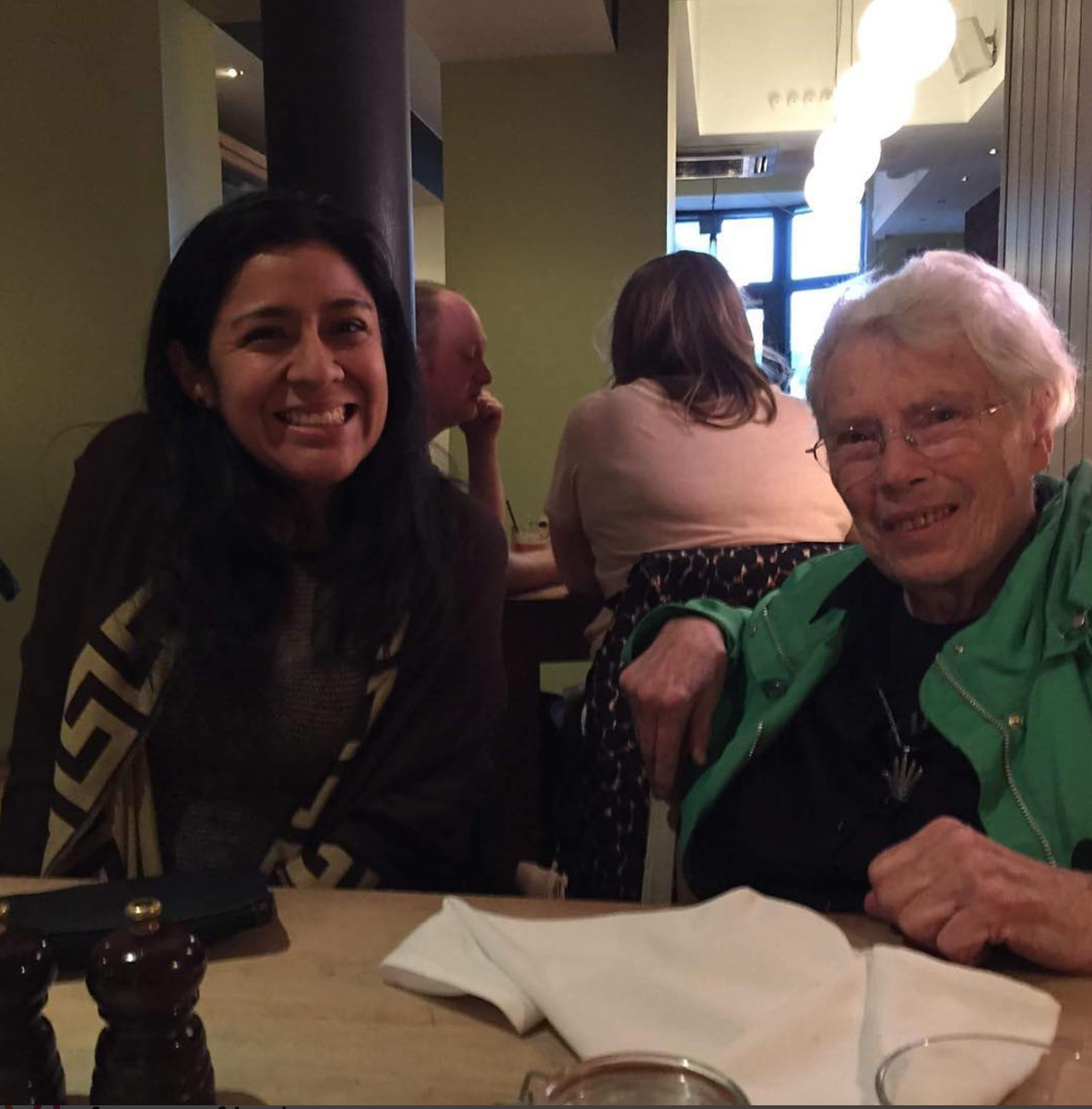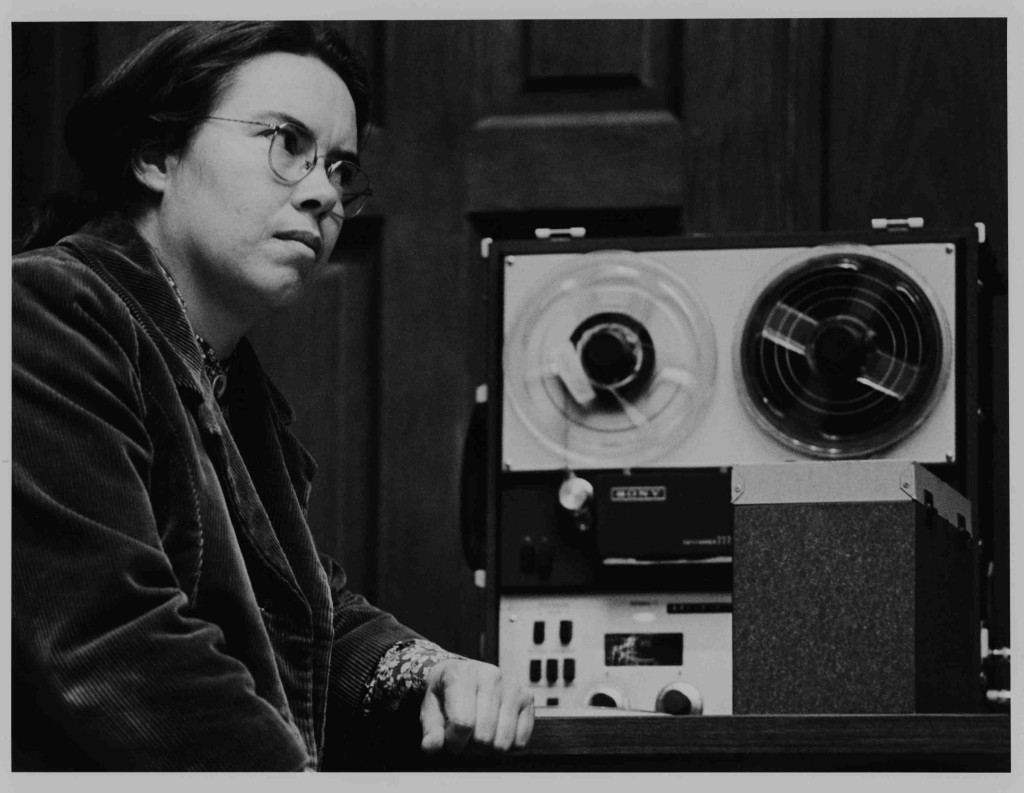On November 24, composer, improvisor, professor, master accordionist, and avant-garde pioneer Pauline Oliveros died at the age of 84. As one of the founding members of San Francisco’s Tape Center in the 1960s and later of her Deep Listening Institute, Pauline’s concept of “Deep Listening” – focusing on the healing, meditative qualities of sound – is fundamental to 20th century experimental music. Oliveros was one of the most innovative voices in modern music, and an openly queer tejana from Houston.
As Pauline told an interviewer in 2003, “In hearing, the ears take in all the sound waves and particles and deliver them to the audio cortex where the listening takes place. We cannot turn off our ears – the ears are always taking in sound information – but we can turn off our listening. How you’re listening, is how you develop a culture and how a community of people listens, is what creates their culture.”
I chatted with sound artist and abstract turntablism pioneer Maria Chavez in a conversation that doubles as a heartfelt tribute to Pauline’s legacy and their shared years of connection through friendship and mentorship. As Maria put it, “You don’t see Steve Reich or John Cage in the trending section with current events and pop stars. She was right above Amber Heard [laughs]. She was so badass.”
Where did this all begin for you? Being that you share Houston as a home city, what was your experience like encountering Pauline’s work?
I was part of this group of improvisors that played together all the time, read Deep Listening practices, and performed; we were like a “Pauline Oliveros fan club” in Houston with all of us ranging from ages 17 to 26. They would come over, because Pauline was from Houston and [musician and colleague] David Dove’s non-profit – the Pauline Oliveros Foundation – was based in Houston. Her mother was a piano teacher before her. So she was teaching piano for at least 75 years to students. She had a piano studio in her house. She still lived in her house when I met her – I think I met her when she was 91.

Edith [Pauline’s mother] was really sharp, bright, strong; I feel like that kind of legacy already was so important to Pauline because she was living around music already. I actually performed my first turntablism/solo turntable performance ever in front of people in [Edith’s] piano studio in the house that Pauline grew up in…At the time, I didn’t know exactly what she represented; I was just learning about it. So, to me, if you said John Cage or any of these names, it would have kind of just hit a wall. So I didn’t know that, or the value of that, and I feel like I’m still understanding it – that she was there from the very beginning.
What was it like being a part of this community at such a formative time? What inspired you to seek out that space?
When we first started to play, they all taught me everything. How to be patient, how to listen, how to love the sounds you hate. They were already playing her Deep Listening practices from the 70s and 80s because David Dove was teaching us her meditations and other practices with the Foundation.
So I became an intern with him because I was getting an audio engineering degree. At this point I had been DJing since I was 16, and this is when I was 21, so I was already DJing publicly for a really long time. I was getting really bored, tired, and desperate to find something new, so when I met Dave and saw this new scene, where you saw free jazz presented in a black box theatre, or a solo percussion set in a white box gallery, I thought, “This is cool.” I began to understand what it’s really for and what it represents in the world.
So then I started playing Deep Listening things with them and that went on until I moved to New York City in 2005. Pauline wasn’t living in Houston anymore, but she was coming back for the foundation, and Dave later decided to change the name to the Nameless Sound Collective. They teach improvisation and free jazz to children that live in shelters and special education [students]; they were developing instruments for children with special needs so that they can play instruments. That was something that Pauline was working on – developing ways of performing where it doesn’t have to be the shape of the instrument but it still sounds that way, which is already so advanced.
You mentioned that Pauline put out her first solo album at the age of 48; what do you think can be learned from what seems like such a respect for focus and patience in her work?
She started late because she was so deeply involved in academia. She’s all about this subtle action that still creates legacy. I think that’s something that people who want to pursue careers in creativity misunderstand. They think that pursuing a career in creativity means you are being perceived in a certain way that is better than – bigger than equal…There’s grace in subtle action. It’s something that’s so sad about media in general is that it’s all about explosions of excitement; it’s not about constant action.
“She’s all about this subtle action that still creates legacy.”
Something that I really admire about Pauline is that she treated everyone equally. It was all about including everyone, letting everyone know where it came from, because it’s all the same thing. She wanted everyone to have access to what she was doing. She was simply a messenger. A brilliant accordionist. A phenomenal improviser. She learned how to harness time. And really accept her place in time. And I think the way that she died really exemplifies that, because she died peacefully in her sleep.
I mean, these ideas are radical now. I can’t even imagine what it was like in the time that she started.
You know, some of that shit that she was doing in the 50s, like when the Tape Center was being introduced to [electronic instrument pioneer] Robert Moog and they were having a meeting about his Moog [analog synthesizer], she was upstairs at the Tape Center making “Bye Bye, Butterfly,” which is one of the most important electronic music pieces of all-time. [Electronic composer and Tape Center co-founder] Morton Subotnik was downstairs learning about the MOOG, and she’s upstairs bouncing balls against the wall and recording it on a microphone. I mean, she was so focused from the beginning. And then, don’t forget, she was a lesbian during this time period where she was surrounded by professional music engineers at a university [level]. That was something I always wanted to talk to her about.
Pauline and [her partner] Ione toured more than any Brooklyn superstars combined – not even including us, not even including the sound people. I’m only talking about who’s popular right now; they toured harder than that.
Ione just embodied a love for Pauline. It was just all giving. Genuine. And when you saw them together, you saw love. That’s what makes me believe in love. Last night I had to DJ in St. Petersburg. There weren’t that many people there. But the people that were there were in love. They were kissing each other, they were sitting with each other, talking to each other. Maybe like six or seven couples, very quiet. So I just started to think about Ione, how I just wanted to play something that made her think about love, to deal with the loss of her love. I just wanted to play love songs for three hours.
“She was simply a messenger. A brilliant accordionist. A phenomenal improviser. She learned how to harness time.”
When it comes to Ione, I think about this one book. It’s called Spell Breaking, and it collects different personal stories from creative women in her circle. And they all talk about that moment when their spell was broken, which is Ione’s term for when you break out of your insecurities and just realize that the world is yours.
It’s powerful to have a word for that moment; I think that’s a process that so many of us go through but sometimes those stories go untold.
That was ultimately what Ione and Pauline connected on. They were women, deeply invested in what was their understanding of time. And presence. And what being on time really was, and how valuable it was. And not being soaked up into the definitions of that time, but rather that it just passes. Every moment I spent time with them, they exuded that knowledge, but it was never overt. It was always kind, it was always in an open way, like, “Yeah, you should know this too. This is what we talk about; this is what we do. We’re always on time.”

How would you say your relationship deepened over time and evolved into her becoming your mentor?
We never had the typical mentor relationship where there was a falling out, I think because she respected me so much and she was so patient. She never saw me as a protégé; we never had that expectation. She wasn’t there for my very first performance in her mom’s studio. She didn’t know until a few years later, actually, that I had done that. And I think that’s the first area where we were actually pulled tighter together, around 2003-2005. Then when she found out I was moving to New York City, as soon as I got there, she was like, “Okay how are you doing? Where are you living?” And just always watched after me.
After my set [in St. Petersburg], I just couldn’t stop. I have this weird new energy now. I’m not ready for this. Give me a few more months and I’ll deal with it. Right now I just don’t understand how the energy is supposed to coincide with the loss. So I feel like I need to just meditate more or something. I mean, she always wanted me to, but I’m just too impatient [laughs]. She was always asking me where my feet were. Because I would get all, “They’re all messing with me; they’re [messing] around.” She would say, “Maria, where are your feet?“ I’d say, “They’re on the ground!” [laughs]. And she’d ask, “Where is the ground?”







